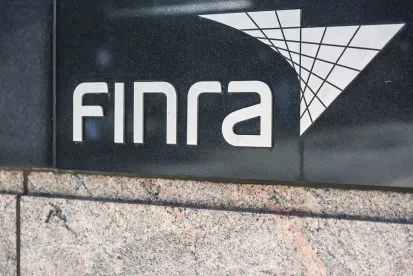On December 23, 2019, the Securities and Exchange Commission approved the Financial Industry Regulatory Authority’s (FINRA) proposed amendments to Rule 5110, as modified by Partial Amendments No. 1 and No. 2 (Amended Rule 5110), on an accelerated basis in an effort to modernize, simplify and streamline the rule. FINRA is expected to issue its regulatory notice and effective date for the amended rules in the coming weeks. Rule 5110 prohibits unfair underwriting arrangements in connection with the public offering of securities. The following is a summary of key revisions made in Amended Rule 5110:
Filing Requirements
Filing Deadlines: Rule 5110 requires that members submit to FINRA documents (such as the registration statement and underwriting agreement) filed with the SEC or any state securities commission. Under the Amended Rule 5110, members will be allowed more time to make required filings with FINRA, increasing the time from one business day to three business days after filing with the SEC.
Document Filings: FINRA will require filing (1) industry-standard master forms of agreement only if specifically requested by FINRA; and (2) amendments to previously filed documents only if disclosure changes impact the underwriting terms and arrangements for the public offering in such documents.
Amended Rule 5110 also makes a number of clarifications regarding filing requirements including: (1) a member participating in an offering is not required to make a FINRA filing, if a filing has already been made by another member participating in the offering; (2) any public offering in which a member participates must now be filed for FINRA’s review unless exempted; (3) no member may engage in the distribution or sale of securities unless FINRA has first provided an opinion that it has no objection to the proposed underwriting terms and arrangements; and (4) any member acting as a managing underwriter or in a similar capacity must notify other members participating in the public offering, if FINRA provides an opinion that the underwriting terms and arrangements are unfair and unreasonable, and the proposed terms and arrangements have not been appropriately modified.
Shelf Offerings: Amended Rule 5110 now codifies exemptions from filing requirements for certain shelf offerings that have historically been exempt and streamlines filing requirements for remaining shelf offerings.
Public Offerings Exempt from Substantive and/or Filing Requirement
Amended Rule 5110 exempts from its filings requirements any public offering conducted by an “experienced issuer” (i.e., an issuer with a 36-month reporting history and with at least $150 million aggregate market value of voting stock held by non-affiliates or, alternatively, at least $100 million aggregate market value of voting stock held by non-affiliates and an annual trading volume of voting stock of at least three million shares). For shelf offerings by issuers that do not meet the “experienced issuer” standard, the filing obligations are limited to: (1) the Securities Act of 1933 registration statement number; and (2) certain limited documents only if specifically requested by FINRA. Also exempt from filing requirements and substantive provisions of Rule 5110 are: (1) public offerings of closed-end “tender offer” funds; (2) insurance contracts; (3) unit investment trusts; and (4) tender offers by issuers for their own securities made pursuant to Rule 13e-4 under the Securities Exchange Act of 1934.
Disclosure Requirements of Underwriting Compensation
Amended Rule 5110 makes the existing practice of disclosing specified material terms and arrangements related to underwriting compensation in the prospectus an explicit requirement and requires a description of: (1) any right of first refusal and its duration granted to a participating member; and (2) any additional material terms and arrangements of securities obtained by the participating member, including exercise terms, demand and piggyback registration rights, and lock-up periods.
Underwriting Compensation
“Underwriting compensation” has now been defined to mean “any payment, right, interest, or benefit received or to be received by a participating member from any source for underwriting, allocation, distribution, advisory and other investment banking services in connection with a public offering.” It includes finder’s fees, underwriter’s counsel fees and securities. Rule 5110 currently provides that all items of value received or to be received from any source are presumed to be underwriting compensation when received during the period commencing 180 days before the required filing date of the registration statement and ending up to 90 days following the effectiveness or commencement of sales of a public offering. Amended Rule 5110 introduces the defined term “review period” and provides that the applicable time period would vary based on the type of offering but would typically include the 180-day period preceding the required filing date through the 60-day period following the final closing of the offering.
Amended Rule 5110 has added several new examples of what will not constitute underwriting compensation, including: (1) advisory services in connection with some corporate reorganizations and payments for records management; (2) legal payments or reimbursement resulting from an issuer’s contractual breach or misrepresentation; (3) securities acquired pursuant to a governmental or court approved proceeding or plan of reorganization as a result of action by the government or court (such as in a bankruptcy or tax court proceeding); (4) non-convertible securities purchased by the participating member in a public offering at the public offering price during the review period; (5) certain accountable expenses; and (6) compensation received through an employee benefit plan that qualifies under Section 401 of the Internal Revenue Code or a similar plan.
FINRA will also take a principles-based approach in considering whether issuer securities received from third parties or in directed sales programs may be excluded from underwriting compensation.
Venture Capital Exceptions
Venture capital exceptions have been expanded by no longer treating as underwriting compensation securities acquisitions and conversions to prevent dilution and securities purchases based on a prior investment history occurring before the review period. When subsequent securities acquisitions take place (e.g., pursuant to a stock split, a right of preemption or a securities conversion, or when additional securities are acquired to prevent dilution of a long-standing interest in the issuer), the acquisition of such additional securities would not be treated as underwriting compensation. FINRA also broadened two of the current venture capital exceptions and adopted a new venture capital exception for highly regulated entities with significant disclosure requirements.
Treatment of Non-Convertible or Non-Exchangeable Debt Securities and Derivatives
Amended Rule 5110 clarifies that the following will not constitute underwriting compensation: (1) non-convertible or non-exchangeable debt securities and derivative instruments acquired in a transaction unrelated to a public offering; (2) securities acquired by a member firm acting as a bona fide market maker; and (3) purchases of both convertible and non-convertible securities during the review period by a participating member in a public offering at the public offering price and on the same terms as all others that are not participating members.
Lock-Up Restrictions:
Amended Rule 5110 provides that the lock-up period of 180 days on securities considered underwriting compensation will begin on the date of commencement of sales of the public equity offering, rather than the date of effectiveness of the prospectus. Exemptions from the lock-up restriction have been added for (1) securities acquired from an issuer that meets the registration requirements of SEC Registration Form S-3, F-3 or F-10; (2) securities acquired in a transaction meeting one of Rule 5110’s venture capital exceptions; (3) securities acquired as underwriting compensation that are registered and sold as part of a firm commitment offering; (4) derivative instruments acquired at a fair price in connection with a hedging transaction related to the public offering; (5) securities that are “actively-traded” (as defined in Rule 101(c)(1) of SEC Regulation M); and (6) the transfer or sale of securities back to the issuer in a transaction exempt from registration with the SEC.
Other Changes:
Amended Rule 5110 clarifies the list of prohibited unreasonable terms and arrangements in connection with a public offering of securities, adds new defined terms and makes certain organizational changes to Rule 5110.
The full text of the SEC Order with Amended Rule 5110 is available here.





 />i
/>i

